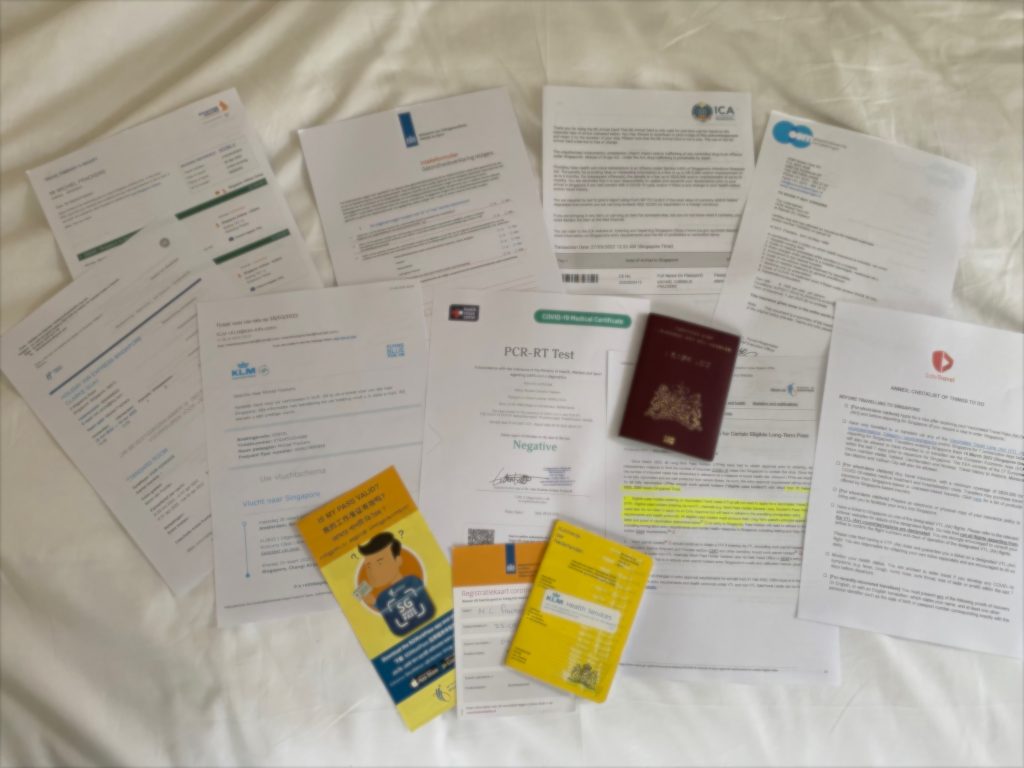Unfortunately, I have not been able to write for the last few weeks because I traveled to Asia and was too busy to properly follow the crypton news; let alone write about it. Travel anno 2022 means lugging along whole folders of documentation and evidence. All these forms of identification and evidence (of nationality, vaccination, insurance, hotel reservations ) could be stored and shared so much more efficiently, securely and cheaply based on blockchain technology.

This is a list of documents, each for the purpose of proving something of my identity, that were required to enter Singapore:
- passport
- visa (not required with an EU passport)
- vaccination certificates
- a so-called "arrival card," to be filled out before departure
- Insurance for any treatment against Covid above SGD 30,000 (about 20,000 Euro)
- residence permit/work visa
- negative PCR test
- proof of home address or residence address (hotel)
[Unvaccinated travel to Asia is virtually impossible unless you can provide medical certificates of serious conditions that prevent you from being vaccinated, and even then they are usually only accepted if you are an immediate family member of a resident with the nationality of the country you want to go to].
The requirements to travel to Indonesia were almost identical. Analyzing the data requested, it appears that two types of data are actually being asked for:
- proof of identity (nationality, a status that rarely changes and then in 1 other variable)
- proof of "reputation" (a status that changes quickly, such as whether or not it is infected, residence or domicile address, health insurance coverage)
In the financial world, where you do not control yourself but rather your assets (money), similar stringent requirements apply. Your identity is verified through KYC (Know Your Customer) when you open a bank account. The origin of money is verified as soon as you receive a large sum under AML/CFT (Anti-Money Laundering/Combating the Financing of Terrorism) regulation.
Knowing the customer is a requirement for banking and also for building trust in transactions in a distributed network. However, this process is cumbersome and expensive. Similar to what happened when I flew on from Singapore to Indonesia and landed in Bali:
- someone from immigration checked my vaccination certificates, the negative PCR test I had done in Singapore, my insurance and checked my hotel reservation
- a nurse performed a PCR test on me
- someone from immigration checked my passport
- someone from immigration sold me a visa
- someone from customs asked what was in my suitcase
A zero knowledge proof, a proof of identity and reputation that allows you to travel yourself; but also allows your money to travel from A to B.
Both international travel and financial transactions could be solved very differently, with the possibilities offered by blockchain. There is a need for an open source protocol that helps people and businesses conduct transactions and use services without an intermediary, while proving their trustworthiness without revealing their identity and storing their raw data securely under their own control. A zero knowledge proof, a proof of identity and reputation that allows you to travel by yourself; but also allows your money to travel from A to B.
Think, from the user's perspective, of an app in which I can store my own passport data and "long running data" such as insurance information and vaccination certificates, as well as my "temporary properties" such as the result of my PCR test and my hotel reservation.
Upon departure from the Netherlands, at Schiphol Airport, all the information required by Singapore was already checked by KLM; that could be verification level 1. But a customs officer, a government representative, also checked my passport again. That could be verification level 2. Upon arrival in Singapore, the whole list of requirements I already listed was verified; that could be verification level 3. That level 3 is then defined as: this data, such as identity, vaccination status and insurance status, has been verified by two governments.
Upon arrival in Indonesia, one customs officer would then have only had to scan my app and verify it with my passport, ensuring that I was the right person with the right app. From the app would have retrieved immutable properties stored in the blockchain, such as my nationality, vaccination status, insurance status, negative PCR test and hotel reservation . And the tourist visa I could have purchased online before I left, which could then also be stored in the app.
For renting a car or scooter or apartment through Airbnb or Booking, landlords could then consult the same app. Because my driving license plus the reviews of previous landlords, my reputation in the 'real world,' could be converted to a digital thumbs up. All from a 'central data vault' whose data I manage myself; and whose data I decide which party to share which data with. So that not every scooter renter has a copy of my passport in his desk, with all the possible consequences.
In the financial world, such a zero knowledge proof application would also satisfy all regulators. You could then, when sending large sums of money, give your own permission for your identity to be shared with the relevant government agency. But not with the first intern, as everyone remembers how GGD officials sold forged vaccination certificates and private addresses of Dutch celebrities, including Peter R. de Vries. The result of the wrong approach with a centralized database to which any nerd could gain access. This can and should be done differently.